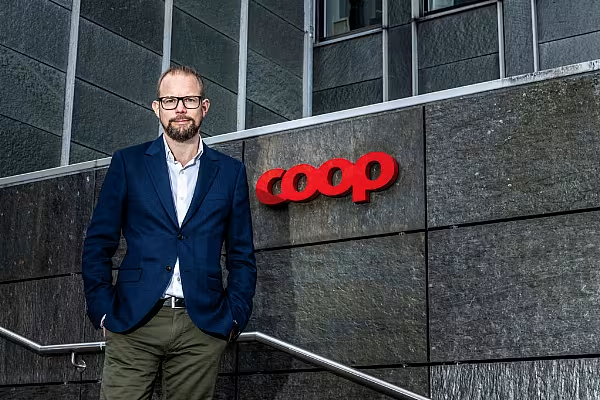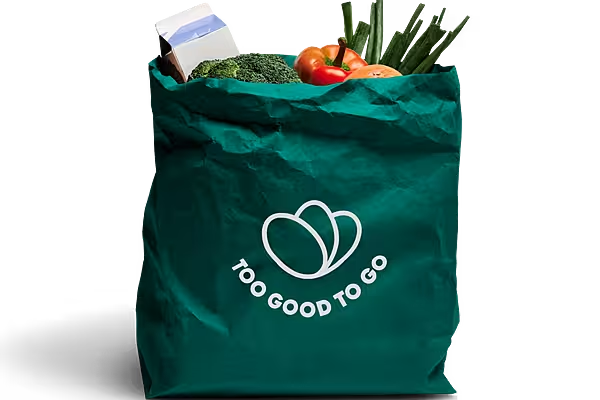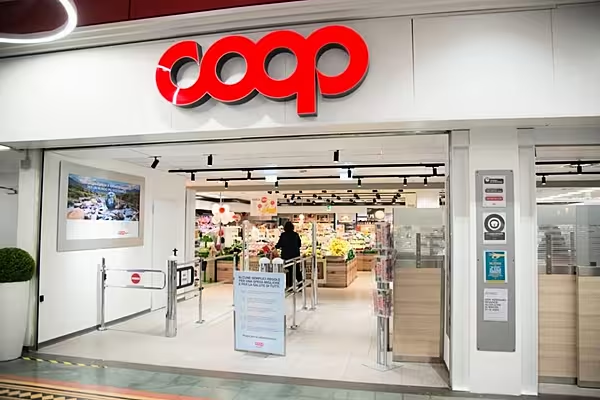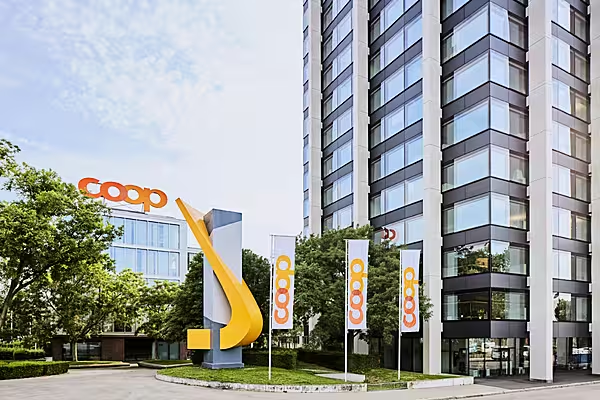Coop Denmark has announced a major restructuring, bringing three of its existing banners together under one master brand. Stephen Wynne-Jones caught up with Coop Denmark CEO Kræn Østergaard Nielsen. This article first appeared in ESM March/April 2023.
The Danish supermarket sector is one of the most competitive in Europe, and it is becoming even more so, according to Coop Denmark, which has just unveiled a new strategy that will lead to the establishment of the country’s largest supermarket chain.
Titled ‘Coop of the Future’, the new strategy will see the majority of the stores under the Kvickly, SuperBrugsen and Irma banners consolidated into one chain – simply called Coop – with the first stores under the new brand set to open at the end of the summer. Elsewhere, its Dagli’Brugsen outlets, along with other stores not consolidated into the Coop brand, will be rebranded as Brugsen.
In summary, Coop will go from having eight chains – Kvickly, SuperBrugsen, Dagli’Brugsen, Fakta, 365discount, Irma, Coop.dk Shopping and Coop.dk MAD – to just three: Coop/Coop.dk, 365discount and Brugsen.
Read More: Coop Denmark To Combine Stores From Three Banners Under New Brand
Decision Time
As Coop Denmark’s CEO, Kræn Østergaard Nielsen, tells ESM, the current set of circumstances in the Danish marketplace – with all-time-low consumer confidence, despite high employment – created a situation that prompted the retailer to weigh up the options when it came to its future strategy.
“Our business is largely in supermarkets, and we have seen a huge trading-down from supermarkets to discounters – and from standard private-label brands to entry-level private labels,” Nielsen explains. “At the same time, the already high share of products sold on promotion is also going up rapidly. That’s true of most markets, but here it’s quite profound. The Danish consumer is really unsure about the future.”
This, in turn, prompted some tough decisions to be made – should the business power on through and stick to its long-term strategy, or should it seize the opportunity to change direction while the industry was in flux?
“It came down to whether we should look at doing short-term crisis optimisation, or whether we should use the crisis as a catalyst to do the fundamental changes, we had planned to do in the future – maybe in 2030,” he says. “We decided to make some bold moves, and go from eight to three banners, to have clearer positioning in the market and dramatically reduce complexity.”
Nielsen began his career on the shop floor at a Coop Denmark outlet – a SuperBrugsen store near Aarhus – before embarking on a 25-year career that took in stints at Dansk Supermarked, facilities management firm ISS, and McKinsey. He rejoined Coop Denmark in 2014 and was named group CEO in September 2020, in the midst of the pandemic – “from one crisis to another, it’s been quite volatile,” as he puts it.
Seismic Changes
One of the boldest steps in Coop’s ‘less is more’ approach is its decision to discontinue its Coop.dk MAD food e-commerce channel, which has been in operation for ten years – albeit running at a loss for its entire duration. In full-year 2021, Coop.dk MAD reported a loss of DKK 54 million (€7.25 million), with the loss for 2022 forecast to be in the region of DKK 71 million (€9.54 million).
“We’ve been in the market for a long time, but we haven’t been able to develop an economically-viable model, even as we were scaling the business during COVID,” says Nielsen. “At the same time, we saw that Salling Group closed its online food store two weeks before our announcement, while the main pureplay online competitor, Nemlig.com, is also reporting record deficits.
“Of course, we do understand that home delivery of some sort is part of the future. We just don’t feel that the model has been cracked yet in Denmark, at least with the very high labour costs that we have here and the extremely high density of stores – around 3,000 grocery stores for six million people. We are keeping our ambition to create world-class digital solutions, but are now focused on augmenting our physical stores.”
Coop isn’t pulling out of the online space altogether, mind you – the group is doubling down its efforts on Coop.dk Shopping, a non-food portal that has, to date, delivered impressive returns. “We acknowledge that we have to find a new way of being in the online space, but in a more financially viable way,” Nielsen adds.
A Historic Move
More controversial still – and a topic that has generated no shortage of column inches in Denmark – is Coop’s decision to wind up its Irma banner, bringing to an end a retail legacy that dates all the way back to 1886. In fact, after Marks & Spencer, it’s the oldest supermarket banner still operating in the world.
In the coming weeks, its stores will be converted to Coop, 365discount and Brugsen outlets, its 2,000 staff members will be offered positions across the wider Coop organisation, and the brand itself will live on as a premium private-label offering.
“This was the toughest decision that we had to make,” says Nielsen. “Even though customer satisfaction is very high and brand recognition is very high, Irma has become a shop where people might buy some pesto or caviar – they wouldn’t do their core grocery shopping there. In fact, a ‘core Irma customer’ now does twice as much of his or her shopping in discount stores.
“We will continue to develop the Irma range as the leading cross-category premium brand in Denmark, and now make it available nationwide.”
Underpinning the restructured Coop is a new management structure, which, the group notes, is ‘simpler’ and will lead to ‘faster decision-making’. Nielsen serves as the administrative director, aka chief executive, of the organisation, while Allan Kristoffersen holds the role of CEO of the Coop chain and Thomas Nielsen directs the 365discount chain.
Elsewhere, Dorte Tandrup oversees the customer, marketing and digital (CMO) department, Per Thau holds the position of group CEO for category and commercial excellence and CSR (CCO), and Lotte Hjortlund Andersen heads the HR, culture and communication (CHRO) team. Finally, Egil Møller Nielsen manages the supply chain, technology and operational excellence (COO) department, Anders Boll Holmelund serves as the group CEO for finance, law and properties (CFO), and Helle Ringer serves as the director of the strategy and transformation (CTO) department. The group’s former CFO, Thomas Brebøl Christensen, has left the business.
“We have been able to remove layers in the organisation, enabling us to be more nimble, and faster in execution and decision-making,” says Nielsen. “This is what we need to be a Coop for the future.”
Room To Manoeuvre
As an organisation that is owned by its members, Nielsen is grateful that, as well as getting on board with the plans at an early stage, all members agreed to keep the plans under wraps until the official announcement at the end of January.
“I’m really grateful for the loyalty that our team members and franchisees have shown, particularly as there was a lot for them to get on board with – changing one football jersey for another is a big deal,” he says. “We have a fantastic collaboration with them.”
Coop isn’t the only retailer seeking to set out its stall in the Danish market at present, of course. REMA 1000 owner Reitan Retail recently announced the takeover of Aldi’s store estate, while Dagrofa is ramping up its FremgangSammen expansion plan, describing the recent takeover of Jutland-based LIVA Stormarked as an example of how it is ‘going on the offensive’.
Acquisitions, however, are one thing – the complete reconfiguration of your business model is quite another. Coop hasn’t been immune to criticism over the extent of its plans – retail is a cyclical business, after all – and while they may be subdued at present, high-end retailing (as represented by Irma) and grocery e-commerce (represented by Coop.dk MAD) haven’t gone away, and they will certainly return at some stage.
Coop is right to seek to simplify its operations – “complexity really is a silent killer of efficiency,” as Nielsen puts it – but was it right to pull the plug on much-loved brands completely?
“Initially, I had the same thoughts that you did,” says Nielsen, “and it’s certainly what some of our loyal Irma customers were thinking, as well as our online shoppers, but there was too much complexity in the business, and even if we were to downsize these businesses, we wouldn’t be downsizing the complexity.
“When I became CEO, I said, ‘Let’s focus on what’s inside the banners, and how well we service our customers with the banner structure we have’. Now, the time has come to radically simplify our business, and I’m 100% confident that taking out unnecessary complexity is really crucial.”
Elsewhere, Coop 365discount, a relatively new banner developed out of a private-label brand – the polar opposite of Irma’s downgrading to own-brand status, in other words – and Brugsen, its community store banner, offer the business greater opportunity to get closer to the shopper, while also being more manageable, from a head-office perspective, Nielsen believes.
“We are becoming much better at assortment-setting, price optimisation and campaign optimisation, as well as supplier negotiations,” he says. “This will provide us with a much more focused operational backbone, focused on three core market positions.”
Read More: Coop Trading Launches New Design For Own-Brand Products
Road To The Future
Developed over a six-month period, Coop Denmark expects the Coop of the Future plan to be fully realised – in other words, all stores and platforms rebranded and/or discontinued – by the fourth quarter of this year. Of course, as recent history has taught us, businesses would do wise to expect the unexpected, so the strategy may require some final tweaking before becoming fully operational.
“As they say about a strategy, it doesn’t survive one day in the battlefield,” Nielsen says. “I’m sure that we will learn something new over the coming months – it wouldn’t be the first time – so, yes, we need to stay agile in developing our plans, but now with a new, clear direction for the Coop of the Future.”
© 2023 European Supermarket Magazine – your source for the latest retail news. Article by Stephen Wynne-Jones. Click subscribe to sign up to ESM: European Supermarket Magazine.














